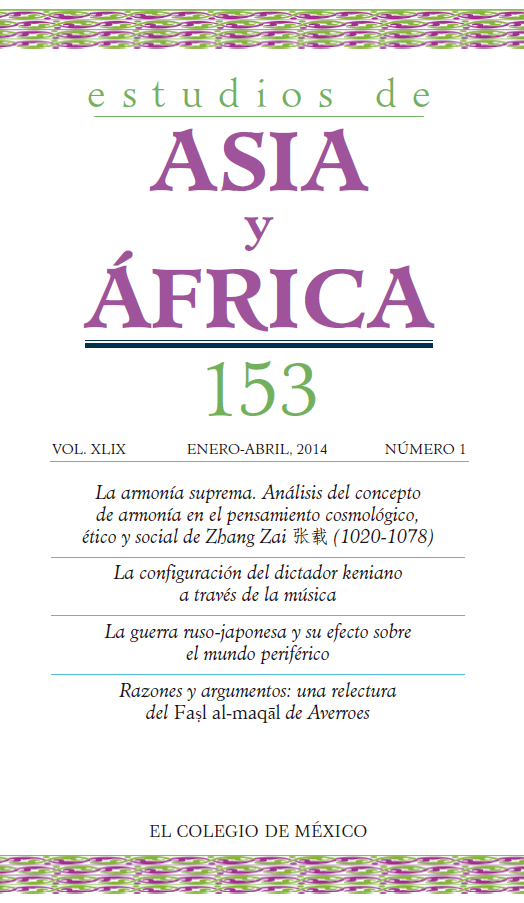Abstract
Despite the fact that the Russo-Japanese War is little known in Latin America, this war had an important impact on the rest of the world, mainly on Asia, and especially on the political-intellectual ground. This impact consists in the manner in which Japan became a point of attraction to many peripheral leaders from different global spaces, which in turn reaffirmed common ideas leading to the conclusion that the West was not invincible. This analysis was made thanks to the Peripheral Thought academic approach.
References
Aydin, Cemil [entrevista con Michael Penn], “Imperial Japan’s Islamic Policies and Anti-Westernism”, The Asia-Pacific Journal: Japan Focus, 22 de diciembre de 2007. [www.japanfocus.org/-cemil-aydin/2612.]
Aydin, Cemil, The politics of anti-Westernism in Asia: visions of world order in Pan-Islamic and Pan Asian thought, Nueva York, Columbia University Press, 2007.
Boele van Hensbroek, Pieter, Political Discourses in African Thought: 1860 to Present, Westport, Praeger, 1999.
Casely Hayford, Joseph Ephraim, Ethiopia Unbound: Studies in race emancipation, Londres, Routledge, 1969.
Devés Valdés, Eduardo, El pensamiento latinoamericano del siglo XX: entre la modernización y la identidad, t. I: Del Ariel de Rodó a la CEPAL (1900-1950) , Buenos Aires-Santiago de Chile, Biblos-Dibam, 2000.
Devés Valdés, Eduardo, El pensamiento latinoamericano del siglo XX: entre la modernización y la identidad, t. II: Desde la CEPAL al neoliberalismo (1950-1990) , Buenos Aires-Santiago de Chile, Biblos-Dibam, 2003.
Devés Valdés, Eduardo, El pensamiento latinoamericano del siglo XX: entre la modernización y la identidad, t. III: Las discusiones y las figuras del fin de siglo. Los años 90, Buenos Aires-Santiago de Chile, Biblos-Dibam, 2004.
Devés Valdés, Eduardo, “Meirokushismo y panasiatismo en Asia oriental, extremo oriente (1860-1920)”, manuscrito, s.a., p. 5.
Devés Valdés, Eduardo, “¿Nuevos agentes en el espacio internacional? Redes intelectuales y políticas: el caso del pan-asiatismo hacia 1900”, Diplomacia, núm. 119, abril-junio, 2009, pp. 21-31.
Devés Valdés, Eduardo, O pensamento africano sul-saariano. Conexões e paralelos com o pensamento latino-americano e o asiático (um esquema) , Río de Janeiro, Consejo Latinoamericano de Ciencias Sociales-Educam, 2008.
Devés Valdés, Eduardo, Pensamiento periférico: Asia-África-América Latina-Eurasia y algo más. Una tesis interpretativa global, Santiago de Chile, Instituto de Estudios Avanzados de la Universidad de Santiago de Chile, 2012.
Duara, Prasenjit, The Global and Regional in China’s National-Formation, Nueva York, Routledge, 2009.
Edström, Bert (ed.), The Japanese and Europe: Images and Perceptions, Abingdon, Routledge Curzon, 2000.
Esenbel, Selçuk, “Japanese interest in the Ottoman Empire”, en Bert Edström (ed.), The Japanese and Europe: Images and Perceptions, Surrey, Curzon Press-Japan Library, 2000, sección 1.7.
Esenbel, Selçuk, “Japan’s Global Claim to Asia and the World of Islam: Transnational Nationalism and World Power, 1900-1945”, The American Historical Review, vol. 109, núm. 4, octubre, 2004, pp. 1140-1170.
Grasso, June M., Jay P. Corrin y Michael Kort, Modernization and Revolution in China: from the Opium Wars to World Power, Nevada, East Gate Book, 2004.
Hogan, Patrick Colm y Lalita Pandit (eds.), Rabindranath Tagore: Universality and Tradition, Madisson, Nueva Jersey-Londres, Fairleigh Dickinson University Press-Associated University Presses, 2003.
Jiannong, Li, The Political History of China, 1840-1928, ed. y trad. Ssu-yu Teng y Jeremy Ingalls, Stanford, Stanford University Press, 1956.
Karpat, Kemal H., The Politicization of Islam: Reconstructing Identity, State, Faith and Community in the Late Ottoman State, Nueva York, Oxford University Press, 2001.
Laffan, Michael, “Tokyo as a Shared Mecca of Modernity: Entwined Reactions to the Russo-Japanese War and their Implications in the Colonial Malay World”, en Rotem Kowner (ed.), The Impact of the Russo-Japanese War, Nueva York, Routledge, 2007, pp. 219-238.
Masaya, Shiraishy, “Phan Boi Chai in Japan”, en Vinh Sinh (ed.), Phan Boi Chau and The Dong-Du Movement, New Heaven, Council on South East Asia Studies/Yale Center for International and Area Studies, 1988, pp. 54-67.
Nguyen, Thê Anh, “Phan Boi Chau et les debuts du movement Dong-Du”, en Vinh Sinh (ed.), Phan Boi Chau and The Dong-Du Movement, New Heaven, Council on South East Asia Studies/Yale Center for International and Area Studies, 1988.
Palasz-Rutkoswka, Ewa, “Major Fukushima Yasumasa and his influence on the Japanese Perception of Poland and the Turn of the Century”, en Bert Edström (ed.), The Japanese and Europe: Images and Perceptions, Surrey, Curzon Press-Japan Library, 2000, sección 2.8.
Prah, Kwesi Kwaa, “African Renaissance, African Culture and Language”, en Armin Osmanovic (ed.), Transforming South Africa, Hamburgo, Institut für Afrika-Kunde, 2002.
Pyle, Kenneth B., “The Technology of Japanese Nationalism: The Local Improvement Movement, 1900-1918”, Journal of Asian Studies, vol. XXXIII, núm. 1, noviembre de 1973, pp. 51-65.
Radhakrishnan, Manju y Debasmita Roychowdhury, “‘Nationalism is a Great Menace’: Tagore and Nationalism”, en Patrick Colm Hogan y Lalita Pandit (eds.), Rabindranath Tagore: Universality and Tradition, Madisson, Nueva Jersey-Londres, Fairleigh Dickinson University Press-Associated University Presses, 2003.
Saaler, Sven y Christopher W. A. Szpilman (eds.), Pan-Asianism: A Documentary History: 1850-1920, Lanham, Rowman & Littlefield, 2011.
Sen, Amartya, “Tagore y la India”, Fractal, vol. III, núm. 10, julio-septiembre, 1998, pp. 121-168.
Sinh, Vinh (ed.), Phan Boi Chau and The Dong-Du Movement, New Heaven, Council on South East Asia Studies/Yale Center for International and Area Studies, 1988.
Sivan, Emmanuel, “The Clash within Islam”, Survival Review, vol. 45, núm. 1, 2003, pp. 34-35.
Sun Yat-sen, “Pan-asianism”, traducción de un discurso pronunciado en Kobe, Japón, el 28 de noviembre de 1924. Tecleado con base en una copia de: Sun Yat Sen, China and Japan: Natural Friends, Unnatural Enemies, Shanghái, 1941, actualmente en la Librería del Congreso en Washington. [http://en.wikisource.org/wiki/Sun_Yat-sen’s_speech_on_Pan-Asianism.]
Sundquist, Eric J., To wake the Nations: Race in the Making of American Literature, Cambridge, Belknap Press of Harvard University Press, 1998.
Tagore, Rabindranath, Nationalism, Londres, Macmillan, 1917.
Twitchett, Denis y John K. Fairbank (eds.), The Cambridge History of China: vol. 11: Late Ch’ing 1800-1911, Part 2, ed. J. K. Fairbank y K. C. Liu, Cambridge-Nueva York, Cambridge University Press, 1980.
This work is licensed under a Creative Commons Attribution-NonCommercial-NoDerivatives 4.0 International License
Copyright 2022 Estudios de Asia y África


